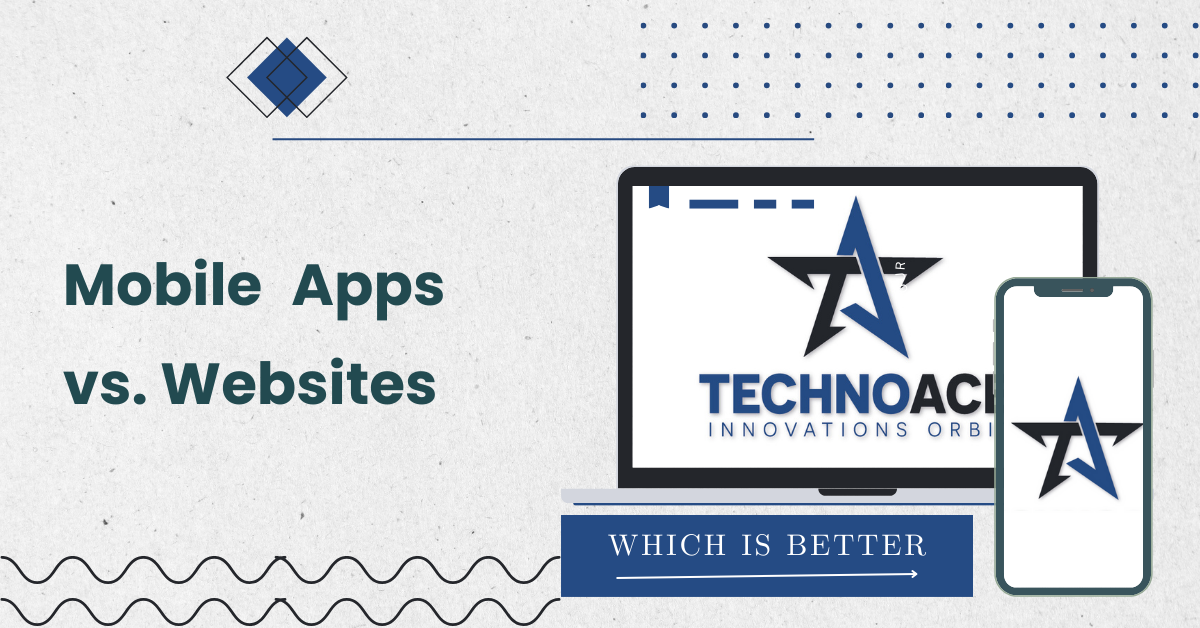In today’s digital world, businesses need to decide whether to invest in mobile apps, websites, or both. With the growing use of mobile devices, it’s important to understand the differences and benefits of each option. This article will compare mobile apps and websites, highlighting their advantages, disadvantages, and best use cases. You’ll find statistics and insights that will help you choose the right approach for your business.
The Importance of Digital Presence
Growing Mobile Usage
According to a report by Statista, as of 2023, mobile devices accounted for approximately 58% of all website traffic worldwide. The increasing reliance on mobile devices means businesses need to ensure their digital presence is optimized for mobile users. This growth is largely due to:
- Convenience: Mobile devices provide easy access to information and services on-the-go.
- User Preference: Consumers are increasingly preferring mobile apps for their convenience and usability.
The Role of Websites
Websites have been the cornerstone of digital presence for businesses for decades. They serve as the primary platform for providing information, showcasing products, and facilitating customer engagement. However, as mobile technology has advanced, the need for websites to adapt to mobile users has become paramount.
The Rise of Mobile Apps
Mobile apps have exploded in popularity due to their ability to offer a personalized experience. According to App Annie, users spent approximately $320 billion on mobile apps in 2022, demonstrating the significant investment in app-based solutions. As businesses evaluate their digital strategies, they must weigh the benefits and drawbacks of each option.
Key Differences Between Mobile Apps and Websites
Before diving into which option might be better for your business, let’s explore the fundamental differences between mobile apps and websites.
1. Accessibility
- Mobile Apps: Apps must be downloaded and installed from app stores. Once installed, they can be accessed directly from the user’s device.
- Websites: Websites can be accessed through any web browser without the need for installation, making them immediately available to users.
2. User Experience
- Mobile Apps: Apps generally offer a more streamlined and intuitive user experience, often utilizing device features (e.g., camera, GPS) for enhanced functionality.
- Websites: While responsive web design can optimize websites for mobile, the experience may still lag behind dedicated apps in terms of speed and interactivity.
3. Performance
- Mobile Apps: Typically perform better as they can leverage device capabilities and cache data locally for faster loading times.
- Websites: Performance can be affected by network speed and server response time, especially if not optimized for mobile users.
4. User Engagement
- Mobile Apps: Offer higher engagement rates due to push notifications and personalized content, which can drive user retention.
- Websites: Engagement may depend on SEO and content marketing strategies, which require ongoing effort to maintain visibility and attract users.
5. Development and Maintenance Costs
- Mobile Apps: Development can be more expensive and time-consuming due to the need for separate versions for iOS and Android. Ongoing maintenance and updates also add to the cost.
- Websites: Generally cheaper to develop and maintain, especially if using platforms like WordPress. However, optimizing for mobile can require additional investment.
6. Marketing Strategies
- Mobile Apps: Marketing efforts may include app store optimization (ASO), in-app advertisements, and partnerships with influencers.
- Websites: SEO, content marketing, and social media are primary strategies to attract traffic and engage users.
Advantages of Mobile Apps
1. Enhanced User Experience
Mobile apps provide a more seamless experience, utilizing device features like camera and GPS for functionality that websites cannot replicate. For example, apps can provide location-based services, allowing businesses to offer personalized promotions and recommendations based on the user’s location.
2. Offline Access
Many mobile apps can function offline, allowing users to access content without an internet connection. This feature can significantly enhance user satisfaction, especially in areas with poor connectivity.
3. Push Notifications
Apps can send push notifications directly to users, providing a powerful tool for engagement and retention. According to Airship, push notifications can increase app engagement by up to 88%.
4. Increased Brand Loyalty
Apps can foster deeper relationships with users through personalized experiences. Businesses that utilize app features to create loyalty programs or exclusive content can see an increase in customer retention rates.
5. Monetization Opportunities
Mobile apps can offer various monetization strategies, such as in-app purchases, subscriptions, and advertisements. According to Statista, mobile apps generated more than $240 billion in revenue in 2023, highlighting their potential for profitability.
Disadvantages of Mobile Apps
1. High Development Costs
Developing a mobile app can be significantly more expensive than creating a website. Businesses must consider the costs associated with designing, developing, and maintaining apps across different platforms.
2. App Store Approval
Getting an app approved by app stores can be a time-consuming process, and there’s no guarantee it will be accepted. This can delay the launch and add to overall costs.
3. Limited Discovery
While apps can be promoted through app stores, they often lack the visibility that websites can achieve through search engines. Users may not discover your app unless actively searching for it.
Advantages of Websites
1. Wider Reach
Websites can be accessed on any device with a web browser, significantly expanding your potential audience. A website is also indexed by search engines, allowing users to find it through organic search.
2. Lower Costs
Websites are generally more cost-effective to develop and maintain compared to mobile apps. This makes them a suitable option for small businesses and startups with limited budgets.
3. Easy Updates
Updating a website can be simpler and faster, as changes are made centrally and reflected immediately. This is especially important for businesses that require frequent updates to content.
4. SEO Benefits
Websites can benefit from search engine optimization (SEO) strategies, increasing visibility and attracting organic traffic. According to Google, 53% of mobile users abandon sites that take longer than three seconds to load, underscoring the importance of optimization.
5. Cross-Platform Compatibility
Websites can be accessed on any operating system or device, ensuring a consistent experience across platforms. This is particularly valuable in a world where users switch between devices frequently.
Disadvantages of Websites
1. Limited Functionality
While websites can be optimized for mobile, they often lack the same level of functionality as mobile apps. Features like GPS, camera access, and push notifications are generally more limited.
2. Internet Dependency
Websites require an active internet connection for access. In contrast, mobile apps can often provide offline functionality, allowing users to engage even without connectivity.
3. Lower User Engagement
While websites can drive traffic through SEO and content marketing, user engagement levels are often lower compared to mobile apps, which can capitalize on push notifications and in-app promotions.
When to Choose Mobile Apps
1. High Engagement Requirement
If your business model relies on high user engagement, such as gaming, social networking, or e-learning, mobile apps may be the better choice. The ability to send push notifications and offer personalized experiences can significantly enhance user retention.
2. Offline Functionality
If your service requires offline access (e.g., travel apps, utility tools), a mobile app is more suitable. Users can benefit from essential features without needing an internet connection.
3. Unique Functionality
If your business requires features that are only possible through mobile devices, such as GPS navigation, camera access, or augmented reality, investing in an app makes sense.
4. Brand Loyalty Programs
If you want to foster brand loyalty through exclusive content, rewards programs, or personalized experiences, a mobile app is an effective platform for implementing these strategies.
When to Choose Websites
1. Information-Driven Business
If your primary goal is to provide information, showcase products, or maintain a blog, a website may be the more effective solution. Websites are easily indexed by search engines, driving organic traffic.
2. Budget Constraints
For startups or small businesses with limited budgets, websites are typically less expensive to develop and maintain. They can serve as a strong foundation for digital marketing efforts without the high costs associated with app development.
3. Broad Audience Reach
If your target audience is diverse and you want to reach users across different devices and platforms, a website is more accessible. This can be particularly beneficial for eCommerce businesses that want to attract a wide range of customers.
4. Quick Updates and Changes
If your business requires frequent updates, such as news sites or event management platforms, websites allow for easier and faster content management. This ensures that users always have access to the latest information.
The Best of Both Worlds: Mobile-Friendly Websites
While mobile apps and websites each have their strengths and weaknesses, many businesses find success with a hybrid approach. Creating a mobile-friendly website can enhance the user experience for mobile visitors while still retaining the broader reach and SEO benefits of a website.
1. Responsive Design
Implementing responsive design ensures that your website adjusts seamlessly to different screen sizes and orientations. This approach improves the user experience for mobile users without the need for a separate app.
2. Progressive Web Apps (PWAs)
Progressive web apps combine the best features of websites and mobile apps. They are accessible via a web browser but can also be installed on a user’s device, offering offline access, push notifications, and fast loading times.
3. Cost-Effective Solution
Developing a mobile-friendly website or a PWA can be more cost-effective than building separate apps for iOS and Android. This approach allows businesses to reach a wider audience while still offering app-like experiences.
Statistics to Consider
- User Engagement: According to a report from Flurry Analytics, users spend about 90% of their mobile time in apps, highlighting the importance of mobile apps for engagement.
- Mobile-First Indexing: As of 2023, Google has transitioned to mobile-first indexing, meaning it primarily uses the mobile version of content for indexing and ranking. This underscores the importance of mobile optimization for websites.
- App Store Growth: According to Statista, the number of mobile apps available in the Google Play Store reached over 3 million in 2023, emphasizing the competitive nature of the app market.
Conclusion: Making the Right Choice for Your Business
The decision between mobile apps and websites is not a one-size-fits-all scenario. Businesses must evaluate their goals, target audience, and available resources to make an informed decision.
When to Invest in Mobile Apps
If your business relies heavily on user engagement, requires offline functionality, or seeks to implement unique features, investing in a mobile app may be the best choice.
When to Invest in Websites
On the other hand, if you aim to provide information, showcase products, or engage a broad audience, a mobile-friendly website may serve you better.
A Combined Approach
Ultimately, many businesses may find the most success with a combined approach, utilizing both mobile apps and websites to maximize their digital presence and engage their target audience effectively.
By understanding the key differences, advantages, and use cases of mobile apps and websites, you can make a strategic decision that aligns with your business objectives and positions you for success in the ever-evolving digital landscape.
Final Thoughts
As technology continues to advance, the debate between mobile apps and websites will persist. Stay informed about trends, user preferences, and emerging technologies to ensure your business remains competitive and responsive to customer needs.



